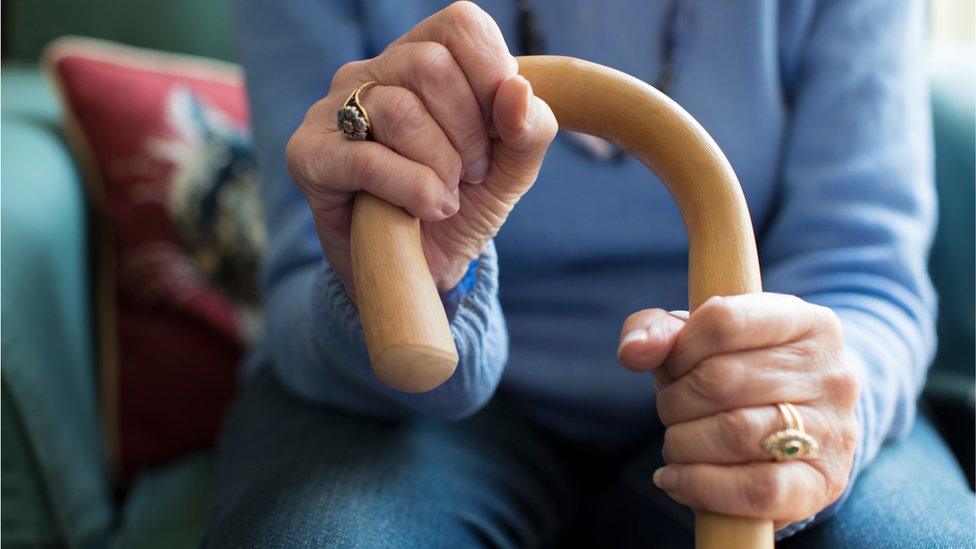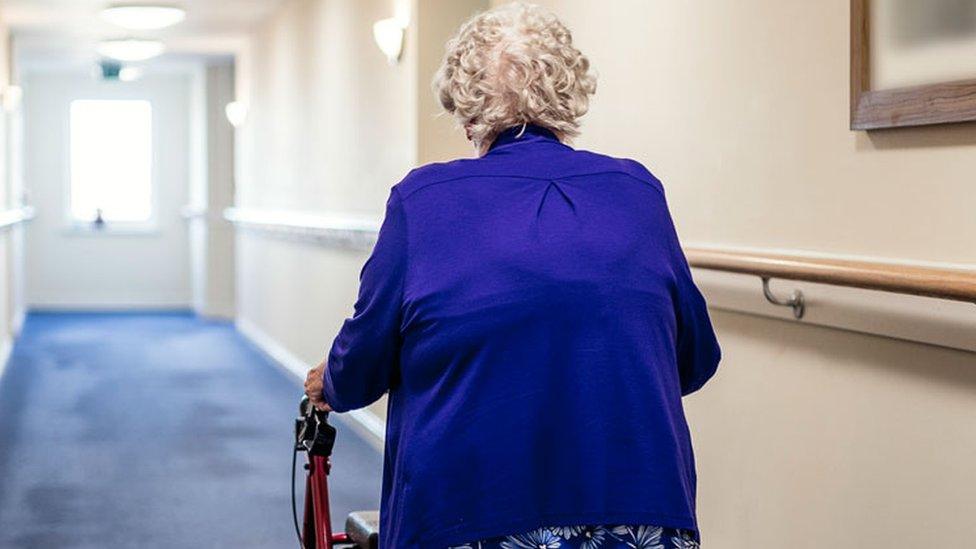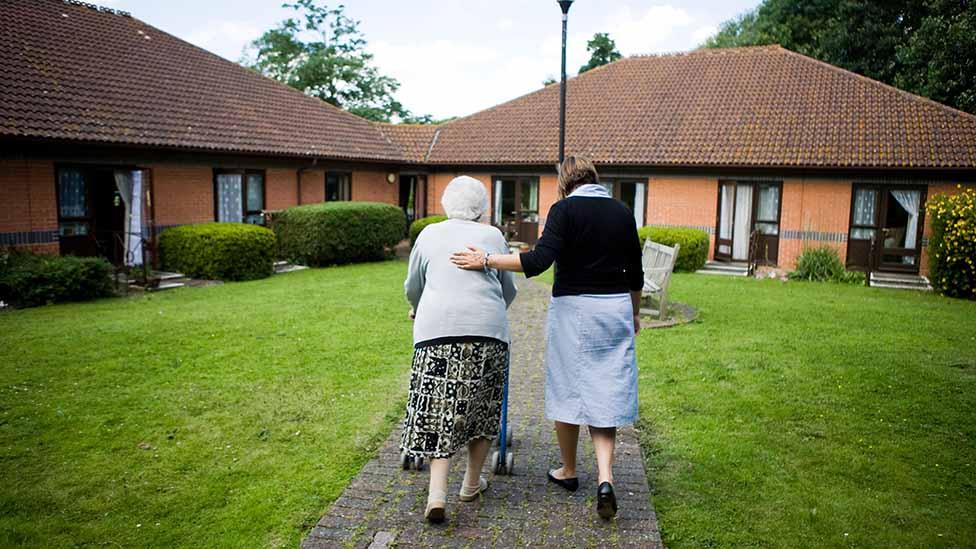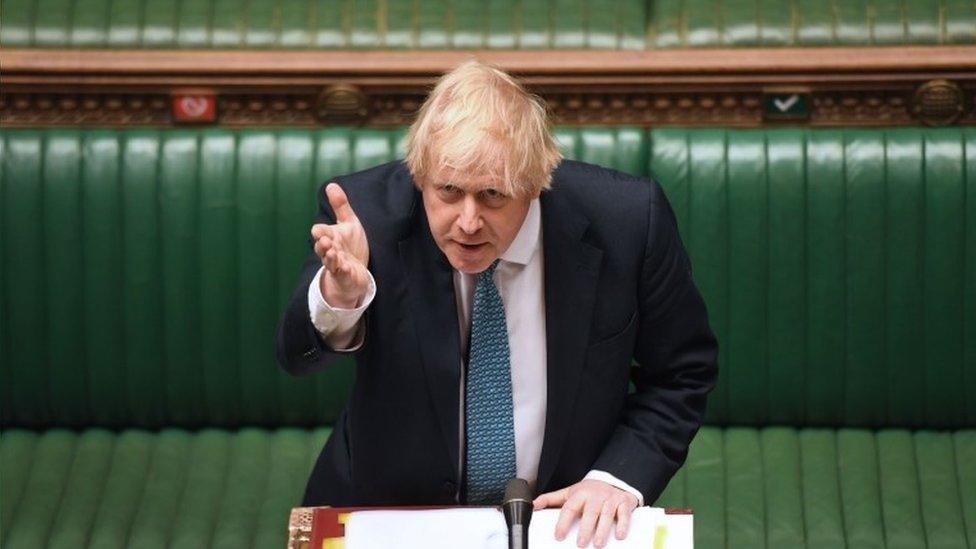Coronavirus: Care homes felt 'completely abandoned'
- Published

A body representing care homes says it may have been "wrong" to prioritise the NHS without protecting elderly residents
Care homes felt "completely abandoned" as the coronavirus crisis swept across the UK, the National Care Association has said.
Nadra Ahmed, chair of the association, said advice to prioritise the NHS without adequately protecting elderly people in care may have been "wrong".
It comes as the government announced £600m to improve infection control in homes.
Health minister Edward Argar denied the government had received "bad advice".
Ms Ahmed told BBC Radio 4's Today programme that care homes had been happy to support the NHS but struggled with a lack of protective equipment as well as with people being discharged from hospital into their facilities without being tested for coronavirus.
She said: "Here we were, suddenly left completely abandoned. And we understand the mantra that was about save the NHS - but our concern was, at what cost was that going to happen?"
The advice to government was "certainly not well put and, yes, perhaps it was wrong", because the sector looking after "the most frail and vulnerable" should have been shielded.
Despite promises that all care home residents and staff can now be tested, she said there were delays in getting results and funding promised for the sector was not yet reaching providers.
The government is aiming to have offered tests to all care-home staff and residents by early June and has made 30,000 tests a day available, according to Lord Bethell, minister for innovation in the Department for Health and Social Care.
But Labour said the roll-out of testing was too slow, with more than 1.5 million tests needed and only tens of thousands carried out so far.
More than 9,700 people with coronavirus have died in care homes, 2,800 of them in the most recent week for which figures have been published.
Meanwhile, the UK's overall death toll rose by 428, to 33,614, according to figures from the Department for Heath and Social Care.
The numbers also showed 126,064 tests had been carried out or posted out on Wednesday - the third time the government has reached its 100,000 a day target.
'Fundamental reform'
The NHS Confederation, which represents NHS trusts and other organisations, said when the crisis was over the UK would need to address the "national disgrace" of "our collective failure to address social care".
Niall Dickson, the confederation's chief executive, said it had been neglected too long and there needed to be "fundamental reform" to combine the social care system and NHS.
Mr Argar told the BBC the £600m announced by government to help stop the virus spreading in care homes had to "get to the front line".
He acknowledged there were still issues with testing, saying the government would continue to "ramp up" its efforts in the coming weeks.
He said: "There is still some capacity there that we need to make available to care homes make sure that everyone can access it quickly and to make sure they can get the results back quickly."
But Labour's shadow housing, communities and local government secretary Steve Reed said the £600m was "a drop in the ocean".
He said that local authorities faced a £10bn shortfall, a third of which was for care homes, and he accused the government of "backtracking" on a promise to provide them with "whatever was necessary to get communities through this crisis".
Mr Argar also denied the government had been badly advised by scientists when it failed to lock down care homes and stop non-essential visits at the same time as Italy on 5 March.

SCHOOLS: When will children be returning?
EXERCISE: What are the guidelines on getting out?
THE R NUMBER: What it means and why it matters
AIR TRAVELLERS: The new quarantine rules
LOOK-UP TOOL: How many cases in your area?

"We have some of the best scientists in the world modelling this and giving us the advice," he said.
"This was a disease that was new, and every day we were learning something new about how it behaved. And it didn't always behave exactly the same way in different countries."
He said Italy was "ahead of us in terms of the curve and community transmission", which Mr Argar said was not occurring in the UK until it moved from the containment phase on 13 March.
But on 5 March, Prof Chris Whitty, the UK's chief medical adviser, told MPs it was "highly likely" the virus was being transmitted between people in the UK.

HOSPITAL SPECIAL: The human stories behind the headlines
JESSE LINGARD'S HOME WORKOUT: Can you keep up?


Has your relative contracted coronavirus in a care home? Or do you work in a care home? Share your experiences by emailing haveyoursay@bbc.co.uk, external.
Please include a contact number if you are willing to speak to a BBC journalist.
Tweet: @BBC_HaveYourSay, external
Send pictures/video to yourpics@bbc.co.uk, external
Please read our terms & conditions and privacy policy
- Published12 May 2020

- Published15 May 2020

- Published13 May 2020
